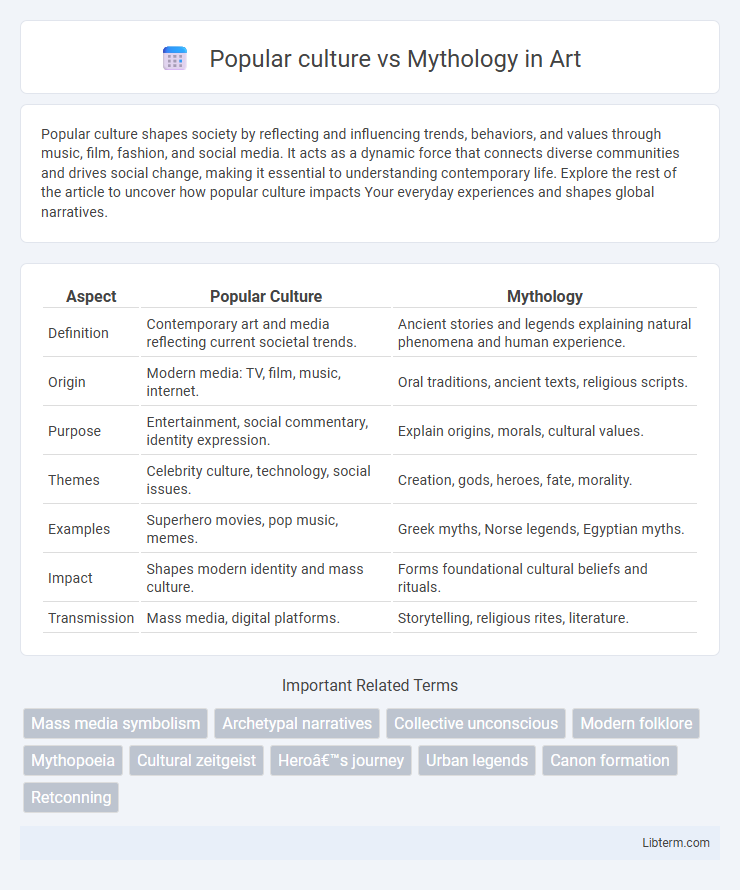Popular culture shapes society by reflecting and influencing trends, behaviors, and values through music, film, fashion, and social media. It acts as a dynamic force that connects diverse communities and drives social change, making it essential to understanding contemporary life. Explore the rest of the article to uncover how popular culture impacts Your everyday experiences and shapes global narratives.
Table of Comparison
| Aspect | Popular Culture | Mythology |
|---|---|---|
| Definition | Contemporary art and media reflecting current societal trends. | Ancient stories and legends explaining natural phenomena and human experience. |
| Origin | Modern media: TV, film, music, internet. | Oral traditions, ancient texts, religious scripts. |
| Purpose | Entertainment, social commentary, identity expression. | Explain origins, morals, cultural values. |
| Themes | Celebrity culture, technology, social issues. | Creation, gods, heroes, fate, morality. |
| Examples | Superhero movies, pop music, memes. | Greek myths, Norse legends, Egyptian myths. |
| Impact | Shapes modern identity and mass culture. | Forms foundational cultural beliefs and rituals. |
| Transmission | Mass media, digital platforms. | Storytelling, religious rites, literature. |
Defining Popular Culture and Mythology
Popular culture encompasses contemporary practices, beliefs, objects, and phenomena prevalent within mainstream society, often driven by mass media, entertainment, and consumer trends. Mythology refers to ancient narratives, legends, and symbolic stories rooted in cultural traditions, explaining natural phenomena, human behavior, and spiritual beliefs through deities and heroic figures. While popular culture evolves rapidly and reflects current societal values, mythology provides foundational archetypes and timeless themes shaping collective identity and moral frameworks.
Historical Roots: From Ancient Myths to Modern Icons
Ancient myths from civilizations such as Greece, Egypt, and Mesopotamia have laid the foundational narratives that continue to influence popular culture, embedding archetypes and themes into contemporary storytelling. Figures like Hercules and Zeus persist as symbolic icons, while modern superheroes often mirror mythological heroes, reflecting enduring human values and conflicts. This historical lineage illustrates the transformation of mythological motifs into accessible and relatable modern pop culture phenomena.
Symbols and Archetypes in Popular Culture vs Mythology
Symbols and archetypes in popular culture often draw directly from ancient mythology, serving as modern reinterpretations of timeless themes like the hero's journey, the trickster, and the mother goddess. While mythology embeds these symbols with spiritual and cultural significance, popular culture adapts them into accessible icons such as superheroes, logos, and narrative tropes that resonate with contemporary audiences. This transformation reflects ongoing cultural evolution, where mythological archetypes are repurposed to express current social values and collective unconscious patterns.
Storytelling Techniques: Tradition vs Innovation
Storytelling techniques in popular culture often emphasize innovation through multimedia integration, interactive narratives, and rapid dissemination on digital platforms, appealing to contemporary audiences. Mythology relies on tradition, preserving oral transmission, archetypes, and symbolic themes that stabilize cultural identity across generations. The tension between innovation and tradition in storytelling reflects evolving cultural values and technological advancements shaping how stories are created and consumed.
The Role of Heroes: From Gods to Superheroes
Heroes in popular culture evolve from mythology's gods and demigods, embodying contemporary values while retaining archetypal traits like bravery and moral struggle. Mythological heroes often possess divine origins and supernatural powers, serving as symbols of cultural ideals and cosmic order. Modern superheroes adapt these narratives with relatable human flaws and advanced technology, reflecting societal changes and the quest for justice in a complex world.
Influence on Society and Identity
Popular culture shapes societal norms and individual identities through widely accessible media, reflecting contemporary values and trends. Mythology influences society by providing enduring narratives and archetypes that embody collective beliefs, moral lessons, and cultural heritage. Both serve as frameworks for meaning-making, with popular culture often adapting mythological themes to resonate with modern audiences.
Evolution: How Myths Become Pop Culture
Myths evolve into popular culture through continuous reinterpretation, adapting ancient narratives to modern contexts in literature, film, and media. The process involves blending traditional mythological themes with contemporary issues, making ancient stories relevant to new audiences. This evolution preserves cultural heritage while allowing myths to influence and shape current pop culture trends globally.
Representation of Morality and Ethics
Popular culture often represents morality and ethics through accessible narratives and contemporary issues, making complex moral dilemmas relatable to a broad audience. Mythology conveys ethical principles using archetypal characters and symbolic stories that reflect ancient societal values and universal human experiences. Both frameworks shape collective understanding of right and wrong, but mythology embeds these lessons within timeless narratives, while popular culture adapts them to modern contexts.
Media Platforms: Oral Tradition to Digital Age
Media platforms have evolved from oral tradition, where stories and myths were shared through spoken word, to the digital age, enabling widespread access and rapid dissemination of popular culture and mythology alike. Oral traditions relied heavily on community and memory for preserving mythological narratives, whereas digital media platforms such as social networks, streaming services, and podcasts allow for global engagement and reinterpretation of these myths in contemporary contexts. This transition has transformed how mythological themes are integrated into popular culture, blending ancient storytelling with modern technology to influence identity, values, and entertainment worldwide.
Enduring Impact: Why Myths and Pop Culture Matter
Myths, rooted in ancient traditions, shape cultural identity by conveying timeless values and human experiences, while popular culture reflects contemporary society's evolving trends and ideologies. Both serve as powerful narratives influencing collective memory, social norms, and moral frameworks across generations. The enduring impact of mythology alongside popular culture lies in their ability to inspire creativity, provide meaning, and foster a shared sense of belonging worldwide.
Popular culture Infographic

 libterm.com
libterm.com